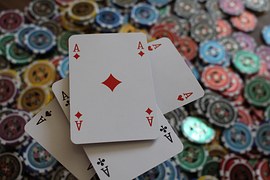
If you start playing in bigger tournaments, or tournaments held at the same casinos, you will often start to run into the same players. This provides great opportunities to take advantage of opponents who are too aggressive pre-flop.
It is very easy to spot overly aggressive players pre-flop. They flush far too often. You can treat these players like personal chip machines. Just punch them and they'll go away. All you need is a little courage.
Example:
You have A ♠- 4♣ . The late stage of the tournament is underway. You have 50,000 and are in 9th place out of 30 players remaining. The blinds are 1000-2000. The poker pro opens the betting to 8000. The aggressor sees you as one of the ABC poker players, which means that you play very predictably. Everyone folds to you in the big blind. So what do you do?
You have 25Big Blinds, so you don't really have to do anything bold. However, this player is pressuring the entire table with his frequent pre-flop raises. He can't have a strong hand every time, right?
Your hand doesn't play very well after the flop, so just calling is a poor option. You could just play it safe and fold. However, if you bust it to 30,000, your opponent will almost always fold.
This is a great way to replenish your chip stack, as these aggressive players may not always have a strong hand, and they will not want to get involved with a closed player whose bust signals a very strong hand.
The mistake that players often make in these situations is that they wait for strong combinations in the hope of beating their opponent. Unfortunately, you will too rarely get a strong hand.
Another thing players like to do is just call pre-flop with a strong hand. They get a hand like A♠ - 10♠, but they are afraid of getting beat, so they just call. Unfortunately, two out of three times, the flop will be completely out of character for the hand they have.
Tip: Timing is everything
Beating an aggressive player works well in all cases, except when the opponent gets a monstrously good hand. One way to tell if a player has pocket aces (or kings) is to watch what happens after his raise. If you notice that he has started to watch things more closely in this hand than he did before, be careful , he wants action.





